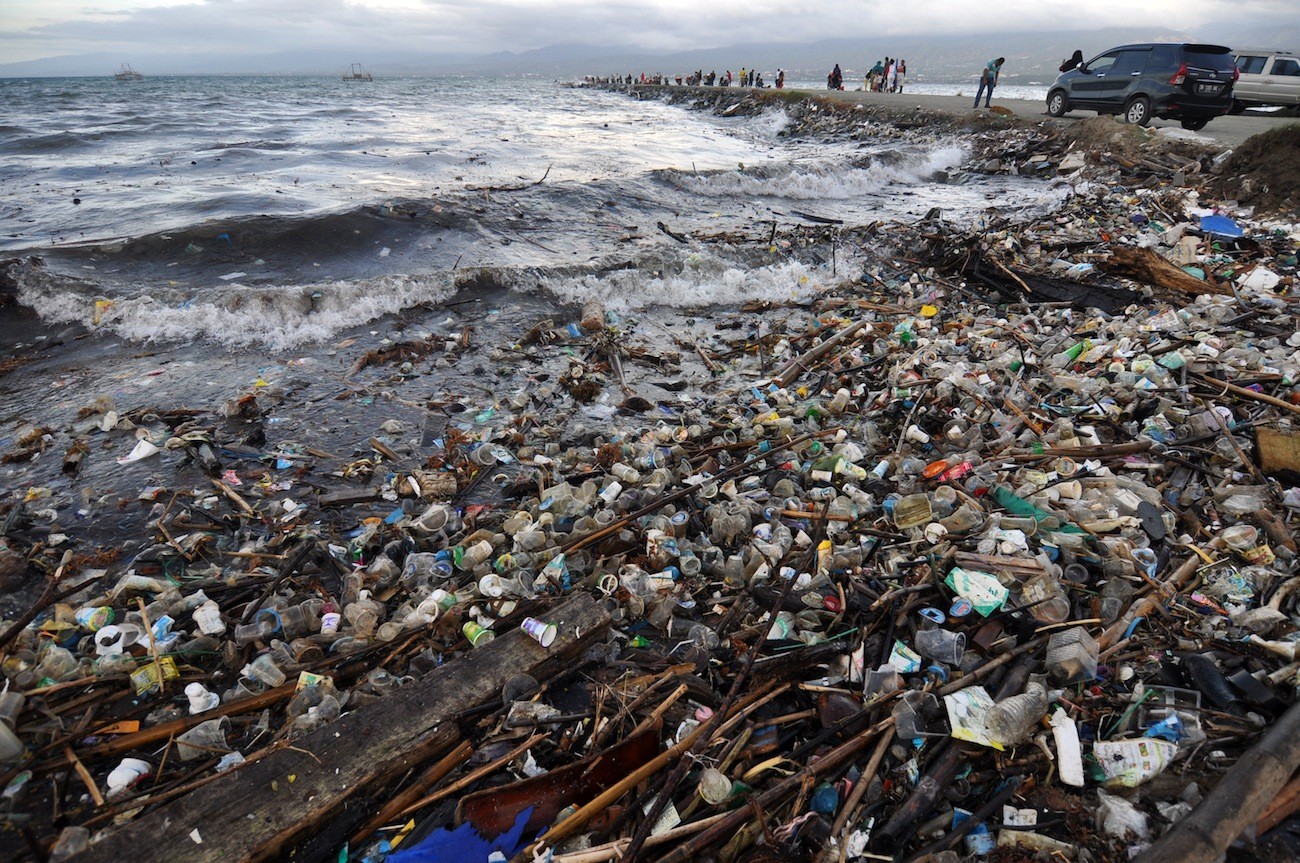Popular Reads
Top Results
Can't find what you're looking for?
View all search resultsPopular Reads
Top Results
Can't find what you're looking for?
View all search resultsIneffective recycling compounds Indonesia’s marine waste problem
Ineffective waste management in the country has made Indonesia the world's second-largest marine polluter. The country allows more than 600,000 tons of plastic waste to enter the sea annually.
Change text size
Gift Premium Articles
to Anyone
I
ndonesia has been in hot water over its contribution to marine waste since 2015, when a report by researcher Jenna Jambeck ranked Indonesia as the world’s second-worst marine plastic polluter for allowing about 1.29 million tons of plastic waste to enter the ocean in 2010 as a result of improper waste management.
The government has been working to prevent waste from ending up in the ocean, including by building the country’s recycling industry.
But the efforts still have a long way to go. Many say the country’s ineffective waste management practices have held the recycling industry back.
Indonesia produces about 6.8 million tons of plastic waste annually, according to a 2017 survey by the Indonesia National Plastic Action Partnership, a multi-stakeholder partnership to address plastic pollution.
Only 10 percent – 680,000 tons – of that plastic waste was recycled in the approximately 1,300 recycling centers operating in the country. Most of the plastic was not properly collected and was dumped into landfills, causing 9 percent or 620,000 tons of plastic waste to end up in the sea in 2017.
Indonesian Plastic Recycling Association (ADUPI) deputy chairman Justin Wiganda said recyclers blamed the country’s insufficient waste management system. Recyclers said they were unable to obtain proper materials for their industry.
“All plastics are actually recyclable. However, the question is whether they can be properly recycled [as a result of their condition],” Justin told The Jakarta Post recently.
Recycling plants can only process plastic waste that has been separated from other waste. However, much of the country’s plastic waste is mixed with other types of waste, preventing the industry from processing it into new raw materials.
Read also: Collaboration makes recycling possible
Justin claimed the problems could not be solved by recyclers investing in the waste management sector to improve plastic processing.
“We’re recyclers, not trash pickers. Our job is to recycle rather than take care of the whole waste problem. We’re not competent in that sector.”
Recyclers have also been hindered by the failure of waste processing companies to process the waste they collected – a violation of Indonesian law.
For example, the Jakarta Environment Agency has recorded 51 licensed waste processing companies in the capital and 343 regional waste managers. These companies are responsible for processing trash and sorting recyclables from non-recyclables.
“However, most of them only want to send [the waste] to landfills instead of processing it first,” said Rahmawati, the agency’s waste management head.
This has diminished recyclers’ supplies of raw materials and increased costs.
“The cost of recycling is higher because the industry needs to sort and clean the plastic waste before recycling it,” said Muhammad Khayam, the ministry’s director general of chemical, pharmaceutical and textile industries.
He added that the ministry was trying to build a circular waste-management economy through collaborations with regional administrations to improve waste management.
The ministry has also prepared a road map for the improvement of the recycling industry. One of the provisions seeks to ease customs levies on imported equipment for the recycling industry.
Read also: Circular economy going around in circles, experts say
The government issued a presidential regulation in 2018 to establish guidelines for ministries and state institutions for the reduction of marine waste. The effort has been led by the Office of the Coordinating Maritime Affairs and Investment Minister and involves other ministries, including the Environment and Forestry Ministry, which supervises the waste management system throughout the country.
The action plan outlined in the regulation is divided into five strategies: increasing stakeholder awareness about the issue, land-based waste management, coastal and ocean waste management, research and development as well as funding and monitoring.
Last month Coordinating Maritime Affairs and Investment Minister Luhut Binsar Pandjaitan unveiled another action plan created by the Indonesian National Plastic Action Partnership to achieve the target of reducing maritime plastic pollution by 70 percent by 2025.
The latest action plan consists of strategies to reduce plastic usage and expand waste management facilities to process more plastic waste.
Green Indonesia Foundation executive director Asrul Hoesein urged the government to ramp up the implementation of the 2008 Waste Management Law, which requires stakeholders to have their own waste management facilities to ensure that waste is processed.
The law also requires producers to clearly distinguish between non-biodegradable and biodegradable products, which will allow waste processors and trash pickers to sort recyclable waste more easily.
Read also: Trash for cash: Apps promote recycling through monetary rewards
Asrul added that the waste management system in the country should be managed as an integrated ecosystem, beginning with waste collection and ending with recycling.
Some Indonesian companies have begun to adopt circular economic practices by recycling their used plastic packaging.
Several plastic recycling companies in the country, such as recycler PT Tridi Oasis Group, have also secured foreign investment to further expand their businesses, enabling them to turn more plastic waste into raw materials for industry. (kuk)










